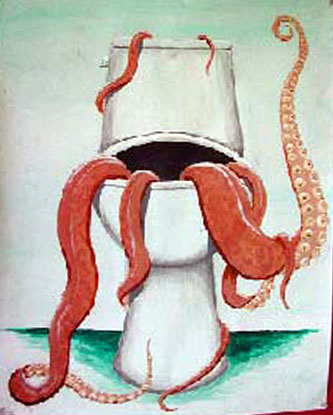Part of a new series, “In a Nutshell,” in which I try to explain an idea in 500 words or less.
When the tentacles of regulation clog your toilet
The Commerce Clause of Article I of the U.S. Constitution gives Congress the power “To regulate Commerce with foreign Nations, and among the several States, and with the Indian Tribes,” and that is the basis for so much of our legal and regulatory system, from drug laws and gun control, to water use regulations for toilets.
Things like building the Hoover Dam to bring water and electricity to multiple states in the American Southwest seems a no-brainer for federal action. Air and water pollution too, with its impact on multiple states and countries, seems to me an obvious place for federal intervention, and the number of regs waived during the past two decades—the carte blanche given to mountaintop removal and hydraulic fracking—should concern all Americans. In many areas, there ought to be more and better regulation, and there are reams of highly questionable or unnecessary regulation too.
A classic example of this “regulatory state” gone awry is what happened with toilets in the ’90s. As the first episode of Constitution USA explores, at around the 40:00 mark, the Energy Policy Act was signed into law by George H.W. Bush in 1992, and water use standards were set for toilets in the U.S. at 1.6 gallons. While I’m the first to favor most water conservation and cleanliness measures, I have to acknowledge the unintended consequences of this toilet rule are bad.
Does the toilet in your home clog at the slightest provocation? If your home/building was built or had a toilet installed between 1993-2000, this rule is probably why. Toilet manufacturers immediately adhered to less water per flush, but that meant low-flow toilets. It was years before toilet design and flush technology caught up, and until then, toilets failed with solid material of even modest size. This legacy of toilet failure is still keenly felt in apartment buildings erected between ’93 and the coming of the 21st century.
The blogosphere had a field day poking fun at Rand Paul for mentioning the non-working toilets at a Senate committee hearing on energy regulations, but dude-bro has a point when he said “the toilets in my house don’t work and I blame you…” (full text statement, video evidence)
Though Paul’s rant kind of reminds me of that Seinfeld episode when Kramer and Newman hated the new low-flow shower heads installed due to related ’90s water regs, so they got crazy high-flow shower heads for circus elephants on the Yugoslavian black market (Seinfeld video), Randy nonetheless has a point. We need technology that works in our homes, and eventually you get innovation and mega uber toilets invented like the Sydney Smart because of the regs, but meanwhile EPIC FAIL occurs. I think a grace period or something to ease the transition is warranted.
I’d make a much broader point: the authority for all this regulation is the Commerce Clause, and all the case law built atop it, but libertarian-ish right-wingers like Rand Paul blame that underlying system… the underpinning system is not the problem as much as the corruption of the guys who write the rules (Congress and/or the federal agencies). That corruption is where things really go wrong. Removing corporate sponsors and corruption from our gov’t is desperately needed, and that is your answer. The wholesale dismantling of the regulatory system is not going to happen.
But criticism of the regulatory state is certainly understandable. What kind of system regulates toilets so rigidly they can’t manage waste of any rigidity, but can’t regulate the hydraulic fracturing industry’s radioactive waste? a corrupt mess of a system that has been affected by “regulatory capture” in a piecemeal fashion, with different but increasing-in-number tentacles of the regulatory octopus captured over the years.

Ultimately, even if the Congress ends up frying a lot of the regulatory octopus’ tentacles, our Commerce Clause is going to mean that federal regulation of things like toilets continues, since toilets are sold across numerous state jurisdictions, and also affect water use regionally and nationally. No toilet exists in a self-contained pocket universe, y’know? But our regulatory state as-is is too messed up, the contradictions too great, and the trust of the rising generation too low-flow for it to be sustainable. Change will have to come for our regulatory octopi, too.
Nick
over 600 words – objective not reached
Recommended resources:
First ep in the documentary mini-series Constitution USA – exploring the Commerce Clause and the state and federal legal tug of war built in to the constitutional system. Can guns built, bought, and used ONLY in Montana be federally regulated under “interstate commerce?” (the Commerce Clause)
The Atlantic -Rand Paul and the 19-year Libertarian War on Low-flow Toilets – the issues here are long-standing…
